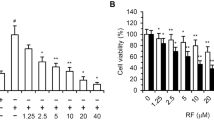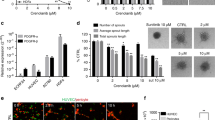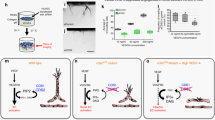Abstract
Our previous studies showed that carboxymethyl benzylamide dextran (CMDB7) blocks basic fibroblast growth factor (FGF-2)-dependent cell proliferation of a human breast epithelial line (HBL100), suggesting its potential role as a potent antiangiogenic substance. The derived cell line (HH9), which was transformed with the hst/FGF4 gene, has been shown to be highly proliferative in vitro and to induce angiogenic tumours in nude mice. We show here that CMDB7 inhibits the mitogenic activities of the conditioned media from HBL 100 and HH9 cells in a dose-dependent manner. When HH9 cells were injected s.c. into nude mice, CMDB7 treatment (300 mg kg(-1) week(-1)) suppressed the tumour take and the tumour growth by about 50% and 80% respectively. Immunohistochemical analysis showed a highly significant decrease, by more than threefold, in the endothelial density of viable tumour regions, together with a significant increase in the necrosis area. This antiangiogenic activity of CMDB7 was further demonstrated by direct inhibition of calf pulmonary artery (CPAE) and human umbilical vein (HUVEC) endothelial cell proliferation and migration in vitro. In addition, we showed that CMDB7 inhibits specifically the mitogenic effects of the growth factors that bind to heparin such as FGF-2, FGF-4, platelet-derived growth factor (PDGF-BB) and transforming growth factor (TGF-beta1), but not those of epidermal growth factor (EGF) and insulin-like growth factor (IGF-1). These results demonstrate that CMDB7 inhibits FGF-2/FGF-4-dependent tumour growth and angiogenesis, most likely by disrupting the autocrine and paracrine effects of growth factors released from the tumour cells.
This is a preview of subscription content, access via your institution
Access options
Subscribe to this journal
Receive 24 print issues and online access
$259.00 per year
only $10.79 per issue
Buy this article
- Purchase on Springer Link
- Instant access to full article PDF
Prices may be subject to local taxes which are calculated during checkout
Similar content being viewed by others
Author information
Authors and Affiliations
Rights and permissions
About this article
Cite this article
Bagheri-Yarmand, R., Kourbali, Y., Mabilat, C. et al. The suppression of fibroblast growth factor 2/fibroblast growth factor 4-dependent tumour angiogenesis and growth by the anti-growth factor activity of dextran derivative (CMDB7). Br J Cancer 78, 111–118 (1998). https://doi.org/10.1038/bjc.1998.451
Issue Date:
DOI: https://doi.org/10.1038/bjc.1998.451
This article is cited by
-
Carboxymethyl benzylamide dextran inhibits angiogenesis and growth of VEGF-overexpressing human epidermoid carcinoma xenograft in nude mice
British Journal of Cancer (2003)
-
Aponecrotic, antiangiogenic and antiproliferative effects of a novel dextran derivative on breast cancer growth in vitro and in vivo
British Journal of Pharmacology (2002)
-
Anti-tumor angiogenesis therapy using soluble receptors: enhanced inhibition of tumor growth when soluble fibroblast growth factor receptor-1 is used with soluble vascular endothelial growth factor receptor
Cancer Gene Therapy (2002)



